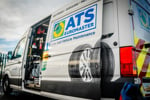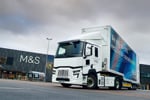##AlistairDarling--left## 'THERE is hardly anyone in the land who doesn't hold strong views on transport. And that's not surprising – after all we all depend on it from the moment we leave our front doors.
And we all know the problems we face. As a country we should have invested more over the decades. And the demands on our transport system are increasing. The problems are relatively easy to identify, but the solutions will always be a matter of much debate and sometimes controversy.
So we have got to engage in these debates and take people with us. Inevitably there will be conflicts and contradictions.
For example, I have been struck by the great affection we have in this country for our railways – an affection surpassed only by the greater love we have for our own cars. My starting point is that people need to travel. They want to travel. And they increasingly can afford to travel more. Most journeys are by road. Indeed, almost three-quarters of the adults in this country can – and now do – drive.
But it isn't just road travel. Since 1997, the number of rail passengers has increased by a fifth. And last year half the population flew at least once. We need to respond to that.
Let's be clear about this: the Government's role must be to help people travel, not stop them. And I believe we can do so in a way that is consistent with our need to conserve and improve the environment in which we all live.
What's needed to improve long distance inter-city routes is different from what's needed to improve local roads, or tackle city centre congestion. The solutions we adopt, whether road, bus or rail, will be as diverse as the problems. We are one of the largest economies in the world and just as past prosperity was a consequence of our ability to move people and goods, so our future prosperity depends on our ability to move people and goods as quickly and efficiently as possible.
But that must be done in a way that is entirely consistent with our environmental and social objectives.
As we look ahead, we must keep these twin objectives in the forefront of our minds. Good quality of life in the future depends not just on a strong economy but on a good living environment too. Now we know that in the future there will be more information transmitted electronically. There will be more home working.
It may be that some of the journeys taken before won't be necessary in the future. But the need to travel will remain.
People will continue to want to get around for work, family and other reasons. The aim should be a better choice where possible, not less choice. And that means continuing to invest in public transport – trains, light rail and buses – as well as roads. As we become more prosperous, lifestyles change and horizons expand. People will continue to want to travel, not just in this country but across the globe.
And, of course, as we become more prosperous, expectations rise too. Time becomes more valuable. People rightly expect to have more control over their lives. This means they expect journeys to be more reliable, transport to be comfortable and high quality information to be available.
And as part of all this, we need to see a change in culture and approach. One that isn't driven by the interests of the producer but by the needs of the customer – the travelling public.
There needs to be, in transport terms, something of a cultural revolution. We need to ask how can we improve travel for the motorist and the passenger. Quality of choice matters as much with transport as it does in any other industry. And we need a balanced approach.
I was struck on the day that I got this job by the number of people who asked was I 'pro-road' or 'anti-car'. The real world isn't like that. Remember that a motorist is also at other times a train or bus passenger or a pedestrian.
The same motorist is also concerned about road safety.
So we need to get the right balance between the need to travel and the need to improve our broader quality of life. And we need to strike a balance between car use and public transport – between road travel and rail.
And above all we need to invest over many years just as other countries have done. And that's what we're doing now. That's why we've allocated more than £180bn over a 10-year period, tackling the big problems and breaking them down into manageable solutions. Spending the investment to the best possible effect.
For example, on strategic road and rail routes, dealing with causes of congestion and overcrowding, improving safety and reliability, improving public transport as a genuine alternative of choice and introducing innovative solutions like the flexible demand-responsive buses.
We will be reviewing the 10-year plan in time for the spending review in 2004. But we have made good progress. Despite increasing road traffic, air pollution from cars has dramatically reduced in recent years.
But we need to do more, because transport still accounts for about a quarter of the UK's energy use and carbon emissions. So we must find ever better technology for all motor vehicles to reduce fuel use and cut emissions as well as other measures. And as no one organisation can achieve this alone it means that all of us need to work together.
So while we must deal with today's problems, we have to look ahead and plan for the future. Over the next decades there needs to be massive investment in our transport system to improve and make better use of the assets we have got. It has to be in the right projects.
We need to engage the public and convince them that it is the right approach. There is a massive task in front of us. There will be much debate about how we should prepare for the world in 2050. But in the meantime the priority is to get on with tackling the problems we face today.















Login to comment
Comments
No comments have been made yet.